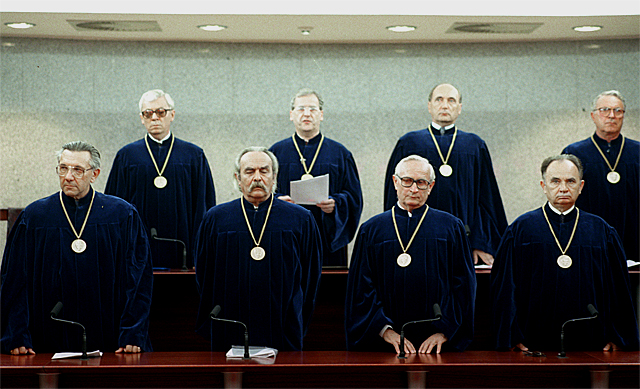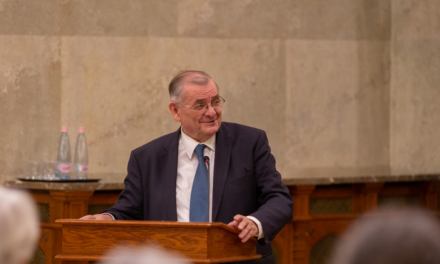Of course, the real question is: why didn't the Antall government touch on the nomenclature? What is the reason, while there were not a few people within the party and the government who wanted this?
I have to say in advance that I don't think we know all the reasons and considerations to this day, and maybe we never will, but two reasons must be mentioned.
The first is to be found in the moderate conservative approach, legal and moral understanding of József Antall The essence of this is that legal continuity and legal security are sacred and inviolable, manipulation of law for political purposes is unacceptable, and the desire for revenge is petty and humiliating; let history pass judgment on the criminals of the past system. This perception was perhaps - indeed certainly - wrong in that the legal order of an oppressive system, a dictatorship, cannot be sacred and inviolable, to which a democracy should retroactively adapt, whereby even the accountability of the top leaders of the dictatorship becomes impossible.
Of course, there were many people in his party and in the government who did not see it that way - and I am not only of István Csurka - and thus some draft laws and proposals were prepared (see the Zétényi-Takács bill on historical justice, the aforementioned Justitia plan, the plan of the White Book, the activities of the Monopoly group, etc.), but these eventually died in ashes, or for other reasons - Constitutional Court veto, the opposition's resistance, etc. they failed.
Here, the specific role of the Constitutional Court in the process of regime change must be raised. There is no doubt that several decisions of the institution established in early 1990, made in the public mood of the regime change, directly hindered the implementation of accountability and historical justice. Why did this happen? László Sólyom , gives a possible answer to this in the very important interview he conducted in 2003. (Sólyom, 2003, 160-162.)
Sólyom clearly explains that for him - and for the AB - then the classic contradiction of justice and legality arose, and even beyond that, the philosophical question is whether constitutionality or natural law, which is above it, is the more important entity? The former president of the AB decided in favor of constitutionality and legality, legal continuity, since - as he explained - he was of the opinion that the essence of the Hungarian regime change was the creation of a constitutional state of law - and nothing else. He justified his particular position by saying that even the Kádár system already allowed people many things in Hungary, so the change of regime meant nothing more than the legal guarantee of freedom opportunities that already existed in practice.
He clearly explains that the Hungarian understanding went against the German, Polish and Czech constitutional understanding, in which countries property compensation was implemented, legal continuity was set aside and justice was provided, from the consideration that dictatorial systems cannot claim that democracies take into account the legal system at that time. The AB made its decisions based on Sólyom's approach: it prevented property compensation, reprivatization, and did not allow the prosecution of former political crimes (with the exception of the 56 shootings, which are non-statutory war crimes). In this respect too, a specific "Hungarian" model has been realized.
At the same time, the former president's argument is not at all acceptable to me, and even surprising. This clearly shows that, in his view, the Kádár system was essentially a "hidden", "disgraceful" democracy in which fundamental freedoms prevailed. I just don't understand why the fact that people could travel to Vienna from time to time under this system would mean real freedom, not to mention democracy? Is it a system in which it is not possible to found a party, in which the party-state secret service operates and reports until the beginning of 1990, in which there was no real protection of rights and impartial judiciary, in which religious, religious and church-going people were disadvantaged, in which it was not possible to organize demonstrations , in which the police could harass people without limits, in which it was never possible to openly criticize the Soviet Union and socialism, in which censorship operated, in which it was impossible to prevail without party membership, in which human and civil rights were not enforced, in which the people of the newly formed Fidesz in the spring of 1988 he was called to the prosecutor's office for an interview - what makes him "essentially" free and democratic? So - in my opinion - László Sólyom's argument is wrong, unfounded and untenable. A political system is either a rule of law or it is not, and the Kádár system was not a rule of law until the last moment - therefore, the requirement of legal continuity cannot apply to it.
Based on all of this, I believe that the Constitutional Court did not help the development and realization of the regime change – Czech, German, Estonian, Croatian model – nor can the historical responsibility of the AB be doubted in this regard. At the same time, I still think that it is by no means possible to "sewn the back of the AB" in its entirety for the system change steps that have been left behind. On the one hand, not because, as Sólyom explains, in addition to harshly preventing compensation and justice, the expulsion of the former party-state elite and nomenclature, as well as secret service personnel from public life, lustration would have been allowed, but the opposition that came to power was unable to do this. On the other hand, because let's think about it: if, after the 1990 elections, the regime change parties in government and forced into opposition had represented the Czech, German, Estonian, Croatian and partly Polish views in complete agreement and unity, they would have been consistent in , justice and a change of elites are needed, then would AB have had the guts and courage to go against this in such a political atmosphere? And even if there had been - which is hardly likely - then wouldn't the regime change forces have been able to implement other solutions to achieve their goals? (For example, governmental decisions, resolutions, political pressure on the president and members of the AB, etc.)
It is clear that in the system-changing "Zeitgeist" these opportunities would have been available to them, if only because their goals would have been supported by the majority of society. However, precisely this determination and consistent, unified will was missing for this, and József Antall took roughly the Sólyom law-following, legal continuity position.
Author: Tamás Fricz, political scientist
(to be continued)













